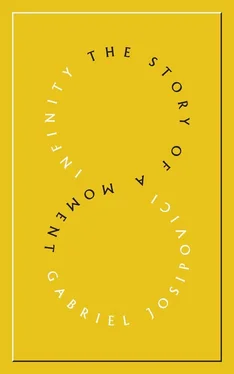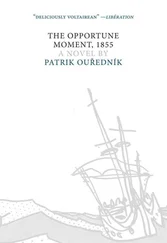Gabriel Josipovici - Infinity - The Story of a Moment
Здесь есть возможность читать онлайн «Gabriel Josipovici - Infinity - The Story of a Moment» весь текст электронной книги совершенно бесплатно (целиком полную версию без сокращений). В некоторых случаях можно слушать аудио, скачать через торрент в формате fb2 и присутствует краткое содержание. Год выпуска: 2012, ISBN: 2012, Издательство: Carcanet Press Ltd., Жанр: Современная проза, на английском языке. Описание произведения, (предисловие) а так же отзывы посетителей доступны на портале библиотеки ЛибКат.
- Название:Infinity: The Story of a Moment
- Автор:
- Издательство:Carcanet Press Ltd.
- Жанр:
- Год:2012
- ISBN:9781847776440
- Рейтинг книги:4 / 5. Голосов: 1
-
Избранное:Добавить в избранное
- Отзывы:
-
Ваша оценка:
- 80
- 1
- 2
- 3
- 4
- 5
Infinity: The Story of a Moment: краткое содержание, описание и аннотация
Предлагаем к чтению аннотацию, описание, краткое содержание или предисловие (зависит от того, что написал сам автор книги «Infinity: The Story of a Moment»). Если вы не нашли необходимую информацию о книге — напишите в комментариях, мы постараемся отыскать её.
Infinity: The Story of a Moment — читать онлайн бесплатно полную книгу (весь текст) целиком
Ниже представлен текст книги, разбитый по страницам. Система сохранения места последней прочитанной страницы, позволяет с удобством читать онлайн бесплатно книгу «Infinity: The Story of a Moment», без необходимости каждый раз заново искать на чём Вы остановились. Поставьте закладку, и сможете в любой момент перейти на страницу, на которой закончили чтение.
Интервал:
Закладка:
— What did he mean by that?
— There must be a reason for every note, Scheler said, Mr Pavone told me, but he never asked himself what a note was. Like all the musicians of Vienna he thought of himself as a radical but he would never let you question the fundamentals of composition. For them a note was a part of a structure, what a note was in itself , what a sound was in itself , that was never questioned.
— Was he living alone in Vienna?
— Yes. He said to me: London was where I experimented with women and Vienna was where I experimented with notes.
— Did he not meet his wife in London?
— Yes.
— But he did not take her to Vienna with him?
— She did not want him in London. She ran away from him and when he followed her and brought her back she ran away again. He said to me: When you are young you think that when a woman refuses you she is simply being coy. It never strikes you that she might not like you or be interested in you. When you are young, he said, your narcissism is so great you imagine you are irresistible. I had had enough of women in London, he said, I had had enough of them in Italy and in Monte Carlo and in London, and I went to Vienna to get to the root of my musical impulses. But in Vienna they almost killed me with thought. Thought, he said, is the great enemy of the artist, but in Vienna they wanted you to think your way through every difficulty. One cannot think one’s way through artistic problems, he said, one has to go about it in a different way. Bach did not think, he said, he danced. Mozart did not think, he sang. Stravinsky did not think, he prayed. But in Vienna they had forgotten how to dance, they had forgotten how to sing, they were all secular Jews and they had forgotten how to pray. Schoenberg was a real musician, he said, but he was a disaster for music. Schoenberg, he said, set Western music back by fifty years, if not a hundred. He terrified his pupils and stopped them thinking for themselves. Had they thought for themselves they would have understood that thought is a disaster for music. It took me ten years to recover from Scheler, he said, and there were times when I thought I would never do so. Had I not gone to Nepal when I did, he said, I doubt if I would ever have recovered from Scheler and Schoenberg and Vienna. In Vienna, he said, I couldn’t look at a score without thinking. I couldn’t strike a note on the piano without thinking. I had ceased to listen and I had ceased to want to make, the two essential prerequisites for the composer. I knew only one thing, that I had to think and account for every note. But why should the sequence of notes be the essence of music? I had known that it was not from the age of three, from the time when I began to attack the piano with my hands and feet. I had known it every time I saw a lovely woman or passed my hand over her breast or buttock. I had known it, you could say, from the moment I was born. But that wretched Scheler almost made me forget it. That is what education does for you, he said, it draws you along paths you know are not real paths until you forget that they are not real paths and think they are the only paths. When I went to Nepal, he said, and I first heard the temple bells and the temple gongs and the temple trumpets, it brought back to me what I had known from the day I was born, but which Schoenberg and Scheler and Vienna had made me forget, that it is not a question of notes, it is a question of attitude. The church bells of Europe have long ceased to make music, he said, they jingle like a music box but they do not make music. But the bells and gongs and trumpets of the Buddhist temples of Nepal and Tibet bring you back to the roots of music. Each sound I heard, Massimo, he said, had taken a lifetime to produce, what do I say, many lifetimes, many generations, to produce, and I realised that each sound is a world, an infinite world, Massimo, it is like a huge cavern which can take a lifetime to explore and yet which is over in no time at all, it is almost as if you could say that it does not exist in time at all. That was the mystery and the paradox I had to grapple with when I returned to Rome, he said, when I returned to my empty house here on the Foro , that was the paradox I began to explore in the first works I would truly claim as my own, Hun dun for solo oboe, Only by Bending for bass clarinet, and, above all Écluse for chamber ensemble. That was the first phase of my career, he said, eight magical years in which single-handedly I rethought the possibilities of music. The climax of that period, he said, was the imaginary puppet opera, Can You Be a Baby Boy? which was performed here in the house by the very best singers and musicians that money can buy, which I had performed for myself and a few friends. Michaux came from Paris, he said. And so did Leiris. Pasolini came. Maraini, who had been to Nepal with me. A few others. After that I stopped composing for two years, I thought my task in the world was done.
He stopped.
— Go on, I said.
— That’s what Mr Pavone said: I thought my task in the world was done.
— And then?
— Then he was silent.
— I mean at other times.
— About his music?
— Yes.
— Once he said to me: Massimo, I am going to tell you a story. Once upon a time, he said, there was a Zen master. His pupil said to him: What can I do to save me from distraction? He said to his pupil: You must listen to the world. His pupil said to him: How can I listen to the world? You must listen to the beating of the heart of the flea, the master said. How can I do that? asked the pupil. Take a flea, the master said, and then stretch a piece of string about a two elbows’ length and tie it to two stakes which you will stick in the ground, about three elbows’ length from the ground. A flea is a very high jumper, Massimo, he said to me, but if you put a flea on a piece of string it does not jump off. So you put the flea on the string and lie down beneath it, looking up at it. The flea will walk the length of the string first one way and then the other, without stopping, he said. At first, the master said to his disciple, all you will see, by staring really hard, is this tiny flea walking along the string one way and then back and then one way again and then back. But after a day of this, he said to his disciple, you will begin to see the flea swelling, and after three days and nights of watching, it will be so big you will be able to see its heart beating, beating, beating in its breast, and you will hear the beating as a roar of thunder and the heart will grow as big as a house and you will want to put your fingers to your ears and to close your eyes because the noise will be so loud, the noise of the flea’s heart beating, and the flea will be so huge. At that point, the master said to his disciple, you will know what it means to see the beating of a flea’s heart. And after that you will be able to see the world as it asks to be seen and to listen to each sound as it asks to be listened to. That is what I have tried to do, Mr Pavone said to me. I have tried to make people listen to each beating of the heart of the flea.
He stopped.
— Go on, I said.
— Yes, sir, he said.
— What else did he say about his music?
— He said to me once: The life of the composer is a solitary life, but it is the best life there is. A composer, he said, who has the time to do what he does best, that is, compose, is the happiest being alive. To be creative, Massimo, he said to me, is to be in a state of constant openness to the world. That does not mean that there are not dark moments, Massimo, he said, there are and there always will be, but they are part of the whole and must be seen as such. To be open, Massimo, he said, does not mean to be driven, as Schoenberg was driven, it does not mean working at your desk for sixteen hours every day, it means being like a flower, Massimo, he said, a human flower. John Cage, he said to me, was a person after my own heart. He understood what it means to be open to the world. Unfortunately what talent he had in his youth had been eradicated by his theories. John Cage had theories about everything, he said, but especially he had theories about not having theories. That is very American, Massimo, he said. You find it in Whitman. You find it in Pollock. And I found it in Cage. The Americans want to invent the wheel afresh each time they draw breath. They are sublimely innocent, he said, which helps them to make money but is a disaster for their artists. John Cage’s instincts were all good, he said, but he was too much influenced by Marcel Duchamp and by Dada. Dada was good for the First World War, he said, but it was no good at all for 1950. I knew many of the Surrealists, Massimo, he said to me. I met them in Paris both before and after the war. Michel Leiris. Philippe Soupault. André Pieyre de Mondiargues. Breton himself. Dali. Jouve. They were all interesting men. Soupault was an anthropologist. He had travelled in Africa and worked in Mexico. Leiris too. But they were in thrall to a pernicious ideology. They recognised that reason is both limited and limiting, but they imagined that the opposite of reason was the unconscious. Dreams. Nonsense. They did not understand that you have to go down a long and difficult road if you are to leave reason behind. You cannot do it overnight. That is why their works feel like schoolboy pranks. Michaux was different, he said. Michaux was a good friend of mine, he said. His art and his poetry came from the heart. Lutosłavski set Michaux’s great poem about the wrestling match between two giants, ‘Le Grand Combat’, not for single voice but for large choir. That was a stroke of genius. It is his best work, but the recording is lousy. It set a new low in the recording of contemporary music. I played chess with Marcel Duchamp, he said. I thought I was quite a proficient chess player, but he was on another plane. As a chess player he was on another plane. A un tout autre niveau . And perhaps as an artist as well. He was on another plane from the Surrealists and the Dadaists. But nobody built on his legacy. They couldn’t, because his legacy was quicksand. Only Charles Ives and Edgar Varèse have known what it is to be a composer in America, he said. Apart from popular geniuses like Gershwin and Berlin, who managed to marry the bittersweet sadness and nostalgia of East European Jewish music with the nostalgia of Black American music. Song in the hands of Gershwin and Berlin became what it had always been in European music, he said, a vehicle for the body to express itself. The language of music is not the sonata and it is not the tone row, he said, it is the same kind of language as weeping, sobbing, shrieking and laughing. That is why music has always been seen as the medium of communication with the spirit world. But the modern world has forgotten this, he said. The sophisticated composers of the modern world have forgotten it. They have been haunted by the idea of opera, he said, but because they have forgotten the bodily origins of music it has nearly always proved to be a disastrous lure for them.
Читать дальшеИнтервал:
Закладка:
Похожие книги на «Infinity: The Story of a Moment»
Представляем Вашему вниманию похожие книги на «Infinity: The Story of a Moment» списком для выбора. Мы отобрали схожую по названию и смыслу литературу в надежде предоставить читателям больше вариантов отыскать новые, интересные, ещё непрочитанные произведения.
Обсуждение, отзывы о книге «Infinity: The Story of a Moment» и просто собственные мнения читателей. Оставьте ваши комментарии, напишите, что Вы думаете о произведении, его смысле или главных героях. Укажите что конкретно понравилось, а что нет, и почему Вы так считаете.












